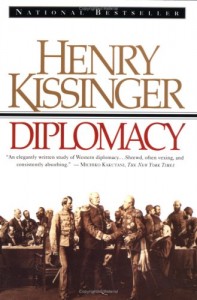 How do I connect the title of the post…
How do I connect the title of the post…
Henry A. Kissinger was sworn in on September 22, 1973, as the 56th Secretary of State, and since that moment was one of those politicians whom people have loved to hate. Just do a Google search and there are all kinds of interesting websites; one even shows the man with a “wanted” ad for “War Crimes.” He was destined to be hated due to his untimely arrival in Washington: the Vietnam was a lost cause politically, and Kissinger’s even- keeled intellect was widely rejected by reactionaries.
Anyway, I read Kissinger’s book – Diplomacy – in in the mid-90s after it came out as it was required for a class and was very impressed with his knowledge. He is an historian and reminded me, as far as his knowledge of history, of our 28th President, and leading Progressive of his time, Woodrow Wilson.
This leads me to a recent book I finished by Ronald J. Pestritto, Woodrow Wilson and the Roots of Modern Liberalism, who literally disects the pattern of idealogy as expressed by Woodrow Wilson. In the book Pestritto “highlights Wilson’s sharp departure from the traditional principles of American government, most notably the Constitution.” Ronald J. Pestritto attempts to argue “that Wilson’s unfailing criticism places him clearly in line with the Progressives’ assault on the original principles of American constitutionalism.” He does do his homework, his research is in depth, and in particular he focuses on the wide ranging array of writings and speeches that Wilson made while a scholar and student of history before he became president.
It’s fair to say that Pestritto is no fan of Wilson’s worldview. He does make an impressive argument, but he did not present an even and fair book. But, then again, that was not his purpose. His goal was to connect the ideology of Liberalism today with the Progressive movement of Wilson and his peers. Pestritto clearly succeeds but I think a lot of Wilson’s Progressive-ness that was obviously for the good of the nation and potetntially for the world had anyone listened. For example, his 14 Points, League of Nations, Moralism, fiscal understanding of a modern economy, all got lost if not ignored by Pestritto. Wilson was a complex individual: intellectual, historian, scholar, racist, populist, progressive, ect. But he saw America as an “Exceptional” nation and saw human progress with America leading the way as uniter of the world. His Ideas for diplomacy and public policy, I think, were visionary and represent what was best in American values. He was not perfect and saw the state has having a larger role in government (a very large role), but clearly that was needed in many respects during his time.
This leads me to my final point. I was pretty pointed with Oliver Stone’s upcoming Documentary. I wonder if he will focus on how European leaders (Britain and France in particular) ignored/spurned Wilson’s call for victory without victors, and his Fourteen Points, as the true cause for the rise of Hitler? I somehow highly doubt it. Stone at least will try to make the connection between evil capitalists and how they underminded Wilson’s 14 Points/ LEague of Nations, that is my prediction.